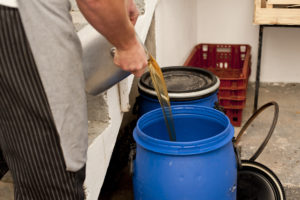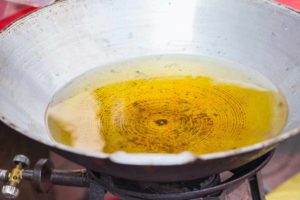Cooking oil is a kitchen staple, but once it has served its purpose, it often ends up being discarded, contributing to environmental pollution. However, with a bit of creativity and ingenuity, used cooking oil can be repurposed in various ways by recycling companies such as NJ Oil Recyclers, reducing waste and benefiting both the environment and your wallet. In this article, we’ll explore 15 creative ways to reuse and recycle cooking oil.
Unlock 15 Ways to Reuse and Recycle Cooking Oil
1. Biofuel Production:
One of the most effective ways to recycle cooking oil is by converting it into biofuel. Biofuels, such as biodiesel, can be used as an alternative to traditional fossil fuels, reducing greenhouse gas emissions and dependency on non-renewable resources. There are DIY kits available for home users to convert used cooking oil into biodiesel, making it an accessible option for environmentally-conscious individuals.
2. Soap Making:
Used cooking oil can be transformed into homemade soap, offering a sustainable alternative to commercially produced soaps that often contain harsh chemicals. By combining used oil with lye and essential oils, you can create luxurious bars of soap that cleanse the skin while minimizing waste.
3. Candle Making:
Transform your used cooking oil into candles by adding a wick and essential oils for fragrance. Not only does this repurpose the oil, but it also creates a cozy ambiance in your home. Homemade oil candles are easy to make and can be customized to suit your preferences, making them an eco-friendly and economical alternative to store-bought candles.
4. Animal Feed:
Certain animals, such as pigs and chickens, can safely consume small amounts of used cooking oil as part of their diet. Before using cooking oil as animal feed, it’s essential to remove any contaminants and ensure that it’s not rancid. Used cooking oil can be mixed with other ingredients to create a nutritious animal feed, reducing food waste and providing additional nutrients to livestock.
5. Moisturizer:
Used cooking oil can be applied topically as a moisturizer for dry skin. Rich in fatty acids, such as oleic acid and linoleic acid, cooking oil helps hydrate and nourish the skin, leaving it soft and supple. Simply massage a small amount of oil onto clean skin, focusing on dry areas such as elbows and knees, for a natural and cost-effective moisturizing treatment.

6. Lubricant:
Instead of purchasing commercial lubricants, consider using used cooking oil to lubricate hinges, tools, and other mechanical devices. The viscosity of cooking oil makes it an effective lubricant for reducing friction and preventing rust. Additionally, using recycled cooking oil as a lubricant helps extend the lifespan of your equipment while minimizing environmental impact.
7. Art Supplies:
Get creative with used cooking oil by incorporating it into art projects. Oil painting, for example, traditionally uses linseed oil as a medium, but you can experiment with using cooking oil as a substitute. Used cooking oil can also be used to create DIY oil-based crayons or mixed-media collages, adding a unique twist to your artistic endeavors.
8. Wood Treatment:
Give wooden furniture and surfaces a natural sheen by treating them with used cooking oil. Simply apply a small amount of oil to a clean cloth and rub it onto the wood in a circular motion. The oil helps condition and protect the wood, enhancing its natural beauty and extending its lifespan. This eco-friendly alternative to commercial wood treatments is both cost-effective and sustainable.
9. Pest Control:
Used cooking oil can be repurposed as a non-toxic pest control solution for your garden. By coating plant leaves with a mixture of cooking oil and water, you can suffocate and deter pests such as aphids, mites, and whiteflies. Additionally, spraying cooking oil around the perimeter of your home can help repel ants and other crawling insects, keeping your living space pest-free without the use of harmful chemicals.
10. Leather Conditioning:
Revive and protect leather goods using used cooking oil as a natural conditioner. The oil penetrates the leather, replenishing moisture and restoring suppleness, while also forming a protective barrier against water and stains. Simply apply a small amount of oil to a clean cloth and gently rub it into the leather in circular motions. This DIY leather conditioning method is both cost-effective and environmentally friendly. To make the use of leftover oil more effective, contact an oil recycling company. Many recycling companies including NJ Oil Recyclers collect oil and then use it for various purposes.

11. Fire Starter:
Turn used cooking oil into homemade fire starters for your fireplace, grill, or campfire. Simply soak cotton balls or cardboard strips in the oil, allow them to absorb the oil completely, and then store them in a sealed container until ready to use. These DIY fire starters are highly flammable and can help ignite fires quickly and efficiently, making them a convenient and eco-friendly alternative to store-bought options.
12. Rust Removal:
Combat rust and corrosion on metal surfaces using used cooking oil as a natural rust remover. The oil’s lubricating properties help loosen rust particles, making them easier to remove with a wire brush or steel wool. Simply apply a generous amount of oil to the rusted area, allow it to penetrate for several hours or overnight, and then scrub away the rust with an abrasive tool. This environmentally friendly rust removal method is effective and affordable.
13. Homemade Salad Dressing:
Give your salads a flavorful twist by using used cooking oil as a base for homemade salad dressings. Combine oil with vinegar, herbs, spices, and other seasonings to create delicious dressings that elevate the flavor of your salads. Not only does this repurpose cooking oil, but it also allows you to customize your dressings to suit your taste preferences, leading to healthier and more sustainable meal options.
14. Waterproofing:
Protect outdoor gear and clothing from water damage by treating them with used cooking oil. The oil creates a water-repellent barrier that prevents moisture from penetrating fabric fibers, keeping you dry and comfortable in wet conditions. Simply apply a thin layer of oil to the surface of the fabric and allow it to dry completely before use. This DIY waterproofing method is an eco-friendly alternative to commercial waterproofing sprays and treatments.
15. Compost Accelerator:
Boost the decomposition process in your compost pile by adding small amounts of used cooking oil. The oil provides carbon-rich organic matter that helps balance the nitrogen content in the compost, speeding up decomposition and producing nutrient-rich compost for your garden. However, it’s essential to use cooking oil sparingly in composting to avoid creating an imbalance in the compost pile.

Conclusion
From biofuel production to compost acceleration, there are numerous creative ways to reuse and recycle cooking oil, reducing waste and benefiting both the environment and your wallet. You can also contact oil recycling companies such as NJ Oil Recyclers and they will handle the recycling process. By exploring these innovative solutions, you can minimize your ecological footprint while discovering new ways to repurpose a common household item. Whether you’re making soap, lubricating tools, or enhancing your salads with homemade dressing, cooking oil has endless potential for reuse and recycling, making it a valuable resource in any eco-conscious household.



